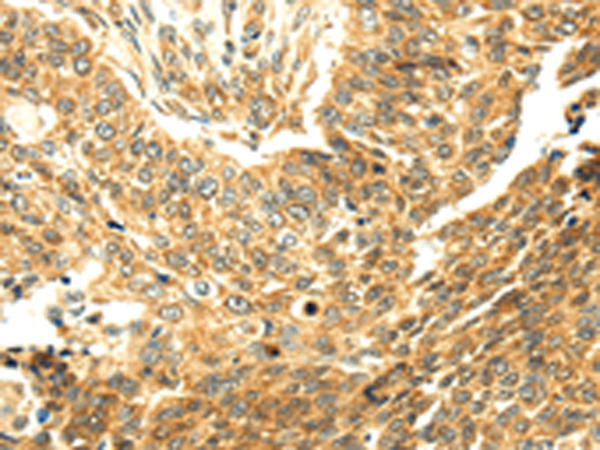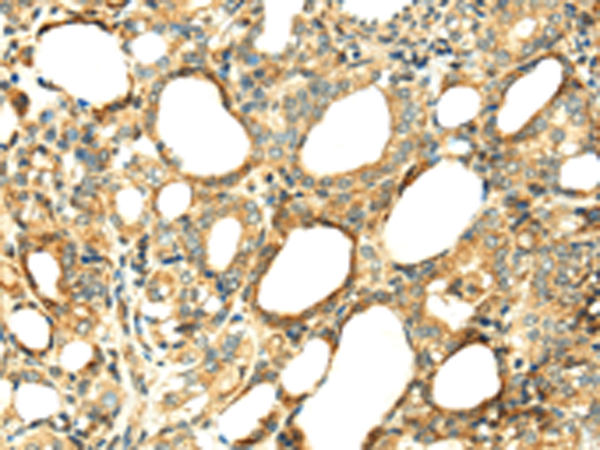

| WB | 咨询技术 | Human,Mouse,Rat |
| IF | 咨询技术 | Human,Mouse,Rat |
| IHC | 1/30-1/150 | Human,Mouse,Rat |
| ICC | 技术咨询 | Human,Mouse,Rat |
| FCM | 咨询技术 | Human,Mouse,Rat |
| Elisa | 1/2000-1/10000 | Human,Mouse,Rat |
| Aliases | OL-64 |
| Host/Isotype | Rabbit IgG |
| Antibody Type | Primary antibody |
| Storage | Store at 4°C short term. Aliquot and store at -20°C long term. Avoid freeze/thaw cycles. |
| Species Reactivity | Human |
| Immunogen | Fusion protein of human SERPINA12 |
| Formulation | Purified antibody in PBS with 0.05% sodium azide and 50% glycerol. |
+ +
以下是关于SERPINA12(vaspin)抗体的3篇参考文献示例,包含文献名称、作者及摘要概括:
---
1. **文献名称**:*Serum vaspin levels in obese children: a novel association with metabolic syndrome*
**作者**:Körner A, et al.
**摘要**:该研究通过开发特异性SERPINA12多克隆抗体,建立了ELISA检测方法,发现肥胖儿童血清vaspin水平与胰岛素抵抗及代谢综合征标志物呈正相关,提示其作为潜在生物标志物的价值。
2. **文献名称**:*Vaspin antibody administration improves insulin sensitivity in high-fat diet-induced obese mice*
**作者**:Hida K, et al.
**摘要**:研究利用抗SERPINA12单克隆抗体进行动物实验,证实其通过调节脂肪组织炎症和增强胰岛素信号通路,显著改善肥胖小鼠的糖代谢异常,为治疗代谢疾病提供新思路。
3. **文献名称**:*Characterization of a monoclonal antibody against human SERPINA12 and its application in immunohistochemistry*
**作者**:Heiker JT, et al.
**摘要**:文章报道了一种高特异性抗SERPINA12单克隆抗体的制备与验证,通过免疫组化分析揭示vaspin在人类肝脏和脂肪组织中的差异表达,为研究其在器官特异性代谢调控中的作用提供工具。
---
以上研究均涉及SERPINA12抗体的开发或应用,涵盖临床检测、机制探索及治疗潜力方向。如需具体文献来源,建议通过PubMed或期刊数据库查询完整信息。
SERPINA12. also known as vaspin (visceral adipose tissue-derived serpin), is a member of the serine protease inhibitor (serpin) family. It is primarily secreted by adipose tissue and has been implicated in metabolic regulation, insulin sensitivity, and inflammatory processes. SERPINA12 functions by inhibiting target proteases, particularly kallikrein 7 (KLK7), which may influence extracellular matrix remodeling and metabolic homeostasis. Its expression is associated with obesity, type 2 diabetes, and cardiovascular diseases, though its precise mechanisms remain under investigation.
Antibodies targeting SERPINA12 are critical tools for studying its physiological and pathological roles. They enable detection and quantification of SERPINA12 in tissues and biological fluids (e.g., serum) via techniques like ELISA, Western blotting, or immunohistochemistry. Such antibodies also facilitate research into its interaction with proteases and receptors, as well as its potential as a biomarker for metabolic disorders. Commercial SERPINA12 antibodies are typically raised in hosts like rabbits or mice, using recombinant protein fragments as immunogens. Validation includes specificity checks using knockout controls or blocking peptides.
Recent studies explore therapeutic applications, such as modulating SERPINA12 levels to improve insulin resistance or mitigate inflammation. However, cross-reactivity with other serpins and tissue-specific expression patterns require careful antibody characterization. Overall, SERPINA12 antibodies remain pivotal in unraveling its dual role as both a protective adipokine and a disease-associated mediator.
×